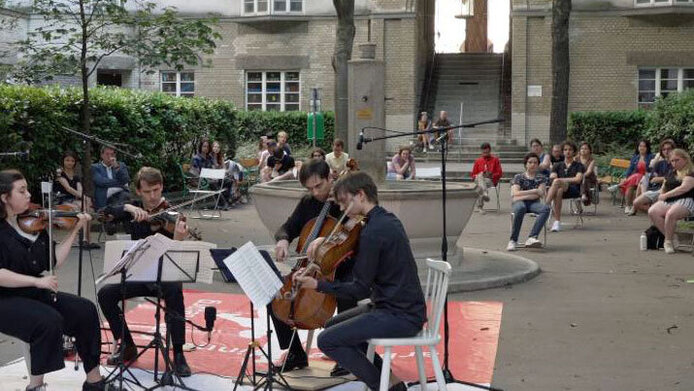Beethoven as a revolutionary in Red Vienna

Housing construction, development of the healthcare system, or educational reform: these were aspects of the innovative social policy pursued by “Red Vienna”, i.e. the Austrian capital under Social Democratic leadership in the interwar period, which made Red Vienna an important historical reference point for urban modernisation. One phenomenon during this period, which was also marked by intensive efforts to provide cultural and general education, was the flourishing of the so-called workers' music movement. Professional musicians and amateurs came together in numerous associations with the mission to form choirs or other musical ensembles. In their repertoires they also opted for traditional, bourgeois art music. At their concerts, even works by Ludwig van Beethoven or Gustav Mahler were performed. But the concerts also served as political events that had a social-democratic agenda and were characterised by a revolutionary mindset.
The musicologist Golan Gur considers this workers' music movement, which combined politics and music in a new kind of relationship, particularly interesting. In the project “Proletarian voices”, funded by the FWF under its Lise Meitner programme, he explored a number of questions in this context: how was music imbued with political impact? How could it be used to develop political awareness? How could works from the classical and romantic canon be reinterpreted from a political perspective during that period? “In the wake of the First World War, the activities of the workers’ music movement expanded strongly, and people also began to make use of new possibilities and to engage more in experiments. Works by Arnold Schönberg or Alban Berg were also performed, for instance,” says Gur. “The special feature of this was that they tried to harness music for political goals without restricting its fundamental freedom in the process.”
A meeting place for musicians, intellectuals and workers
The beginnings of the workers' music movement can be traced back to the mid-19th century, when the first choirs were founded in the wake of workers' educational associations. At that time, involvement of these associations in a social-democratic agenda was still hampered by strict censorship. One focus of Gur's work is on the workers' symphony concerts organised from 1905 onwards and their founder, the writer and journalist David Joseph Bach. “Bach, a good musician himself, was a music critic and a friend of Arnold Schoenberg. He was one of the intellectual fathers of the idea that music can reflect the world of the workers and pave the way to a social-democratic society,” Gur explains. The workers' symphony concerts became occasions that brought together musicians, intellectuals and workers, and where professional instrumentalists and workers' choirs performed together.
Before the First World War the musical repertoire was still predominantly conservative, but as it became embedded in Red Vienna, the movement became more modern in its outlook. The number of clubs and events increased, but there was more to it. “There was not only an increase in quantity, but also in quality, which included a new take on the musical tradition,” Gur notes. “The process of appropriating this tradition included musical theory and interpretation.” The Beethoven Year in 1927 may serve as an example. On the occasion of the 100th anniversary of Beethoven’s death, there were a large number of publications in the the workers' movement press that interpreted his music in a working-class spirit. Gur: “Beethoven's Ninth Symphony with its 'Ode to Joy', for instance, was understood as calling upon the working class to emancipate itself and advance the socialist revolution.” The workers' symphony concerts also forged close ties with representatives of the musical avant-garde of the time. The composer and conductor Anton Webern – a student of Schönberg – served as long-standing director of the concert series and gave joint concerts with the choir “Freie Typograhia”, a book-printers’ choir with a long tradition.
The revolutionary potential of music
When the workers’ music movement thus reinterpreted musical emotion as political impetus, it called into question another theoretical position of the time – namely that music was an abstract, autonomous entity that could not be charged with extra-musical contexts and could not, therefore, be political. David Joseph Bach and his comrades-in-arms begged to differ. “Bach believed that the revolutionary potential of music was similar to that of science, which engendered so many innovations,” Gur explains.
Gur is convinced that the question of the contexts in which music can or may be placed is not only relevant in historical terms, but also has relevance for issues of the present. “Classical music that originated in an upper middle-class milieu of the 18th or 19th century often remains limited to a middle-class audience to this day. However, the study of the workers' music movement shows that music from the past can certainly take on meanings that go beyond the social milieu of its origin.” This is also relevant for a current-day reception and communication of classical music, which must not become disconnected from what we consider relevant today. Gur: “If you always look at music in an isolated fashion, without relating it to other issues within a society, it will eventually lose its significance for that society.”
Personal details
Golan Gur is a musicologist specialising in the aesthetics and cultural history of modern and contemporary music. He studied at Tel Aviv University, at the Ludwig-Maximilians-Universität in Munich and the Berlin Humboldt-Universität. In 2014 and 2015, he did research in Cambridge as a Newton International Fellow. Other research stints have taken him to the Herbert D. Katz Center for Advanced Judaic Studies at the University of Pennsylvania, the IFK International Research Center for Cultural Studies at the University of Linz and the Johannes Gutenberg University Mainz. Between 2020 and 2022, Gur completed a Lise Meitner Fellowship of the FWF, endowed with EUR 172,000, at the mdw – University of Music and Performing Arts Vienna.





